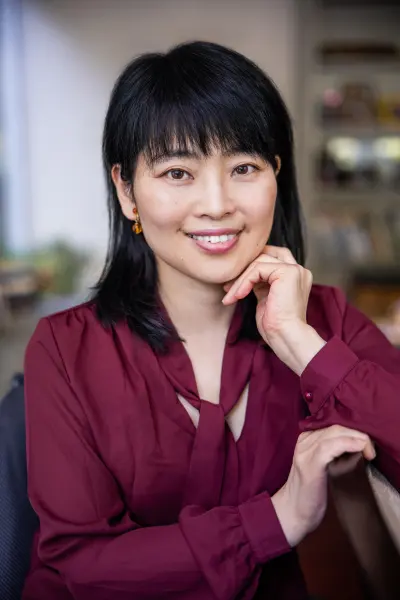 Keiko Honda has worked in academia for over 10 years in the public health field in the US and internationally. She is now running her non-profit, Vancouver Arts Colloquium Society, to link her passion and experience to building healthy and more resilient communities. Keiko completed a Doctorate in Public Health at NYU and a post-doctoral fellowship in Cancer Epidemiology at Columbia University where she worked as a research scientist before she moved to Vancouver in 2009. She is currently teaching a course, Social Artistry Through Co-Creation at the SFU Continuing Studies to shed light on the shared roots of artistic development and systems change to create more possibilities in our community.
Keiko Honda has worked in academia for over 10 years in the public health field in the US and internationally. She is now running her non-profit, Vancouver Arts Colloquium Society, to link her passion and experience to building healthy and more resilient communities. Keiko completed a Doctorate in Public Health at NYU and a post-doctoral fellowship in Cancer Epidemiology at Columbia University where she worked as a research scientist before she moved to Vancouver in 2009. She is currently teaching a course, Social Artistry Through Co-Creation at the SFU Continuing Studies to shed light on the shared roots of artistic development and systems change to create more possibilities in our community.
Accidental Blooms shares moments of your life before, during, and after your diagnosis. When did you first decide to write a memoir?
Upon reaching the age of 50, I began thinking about how to cultivate energy and harmony in the later years of life and what further lessons I needed to learn. I initially turned to the legacy of my beloved late maternal grandfather, Konosuke, with whom I grew up. I was always captivated by his exceptionally curious mind and passionate way of life, filled with art, despite being a retired banker without any formal art training. An avid reader, oil painter, poet, fishing enthusiast, go-player, and traveller, he inspired me in many ways. So, I wrote an essay exploring how his artworks shaped his remaining personal life and even prepared him for his peaceful departure from this world. At the same time, inspired by his example, I began teaching myself watercolour painting
Shortly after I wrote about Konosuke, my mother passed away. Again, I began to write. Immersing myself in writing about our shared memories, I found myself creating two dozen essays. It occurred to me that, just as my mother and grandfather had left me legacies in the form of my deep memories of their lives, these essays might someday become a useful legacy for my then-teenage daughter. This motivated me to synthesize these essays into a coherent memoir.
Your memoir examines community, motherhood, and identity as a Japanese immigrant. You created the Vancouver Arts Colloquium Society – what is this community like and what does it mean to you?
Vancouver Arts Colloquium Society, fondly known as VACS, has been a true catalyst for personal and collective growth. When I use the term ’catalyst,’ I refer to the transformative process of returning to the ‘beginner’s mind,’ rediscovering our life purposes, and collectively navigating the uncharted territories of the unknown. VACS serves as a catalyst, utilizing art to promote self-discovery, which is a crucial step in fostering collective wisdom and engaging in harmonious co-creation among community members from many different backgrounds.
As we celebrate the 10th anniversary in 2024, our emphasis is increasingly on fostering intergenerational collaboration. We find ourselves in a unique historical context, possibly humankind’s most age-segregated era. I believe you don’t need convincing of this fact. What is our community like? Ideally, it resonates with the word ‘connected’—an authentically and deeply human state.
You have a diverse academic background: including a PhD from New York University, as a research scientist at Columbia University, and as a lecturer at Simon Fraser University. How have these academic and professional experiences impacted your writing?
It’s an intriguing question. I can only answer by referring to my disposition. I have a deep passion for uncovering connections, which is reflected in my background in epidemiology and the scientific method. I am drawn to identifying the component layers of cultural and social organization that contribute to human flourishing, spanning from the micro to the macro, and drawing parallels with similar concepts from other disciplines. I often attempt to visualize these insights through diagrams or mind maps. Reflecting on the integration of writing and watercolor painting, I now understand that my watercolors functioned as a dynamic ‘model,’ aiding in the exploration of further ideas for synthesis. Being in academia helped me to analyze the complexities of life events and emotions and recognize some patterns and relationships.
Regarding writing, I initially grappled with the first-person perspective, influenced by my previous professional writing, which was predominantly third person and lacked personal style, let alone an aesthetic sense. However, during my leisure time, I enjoy reading books with imaginative visualizations, such as those by Haruki Murakami. I aspire to translate that style into my non-fiction writing. I must also acknowledge that English is not my native language, so expressing precisely and fluidly what I mean in English isn’t second nature to me, as you may notice when reading this.